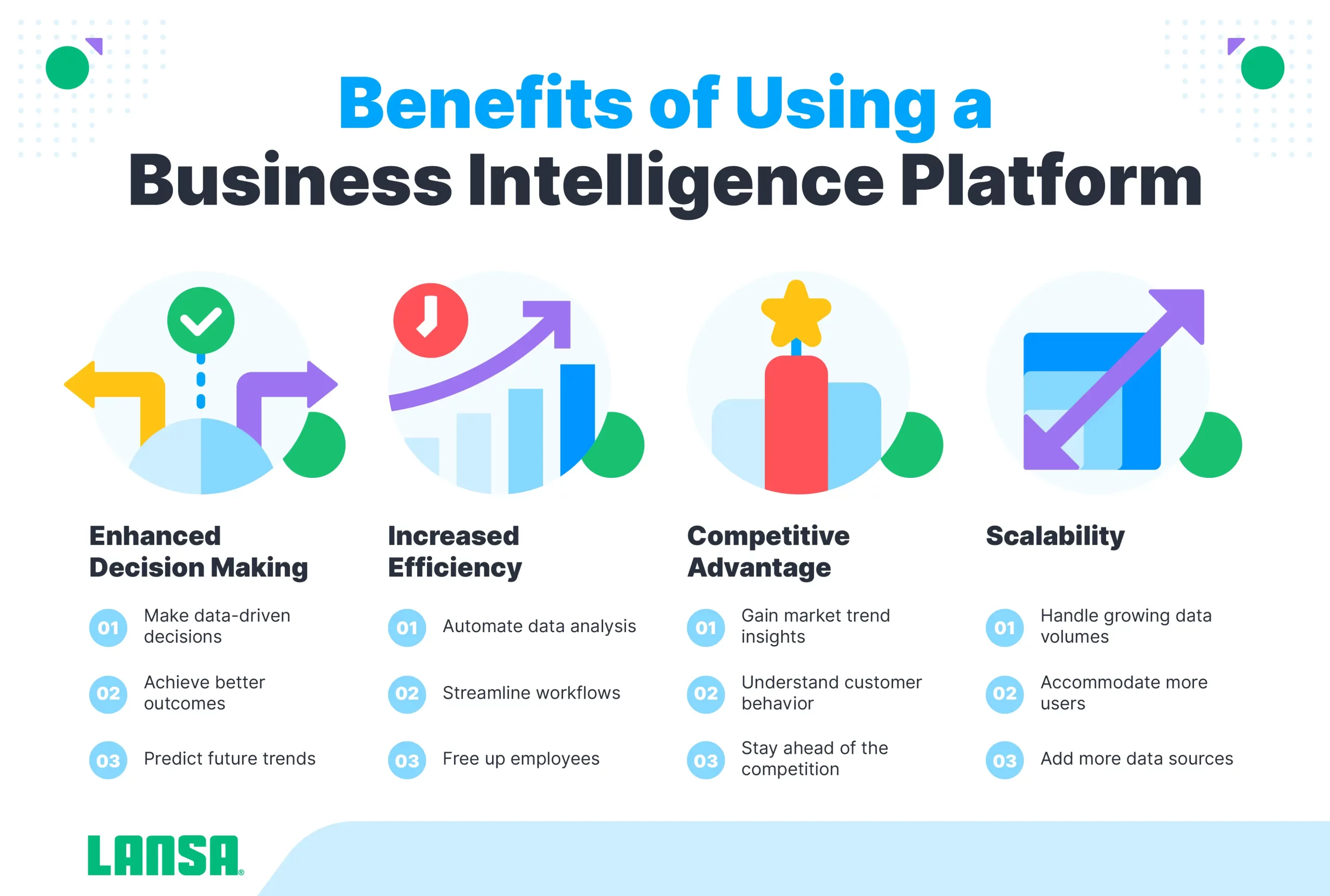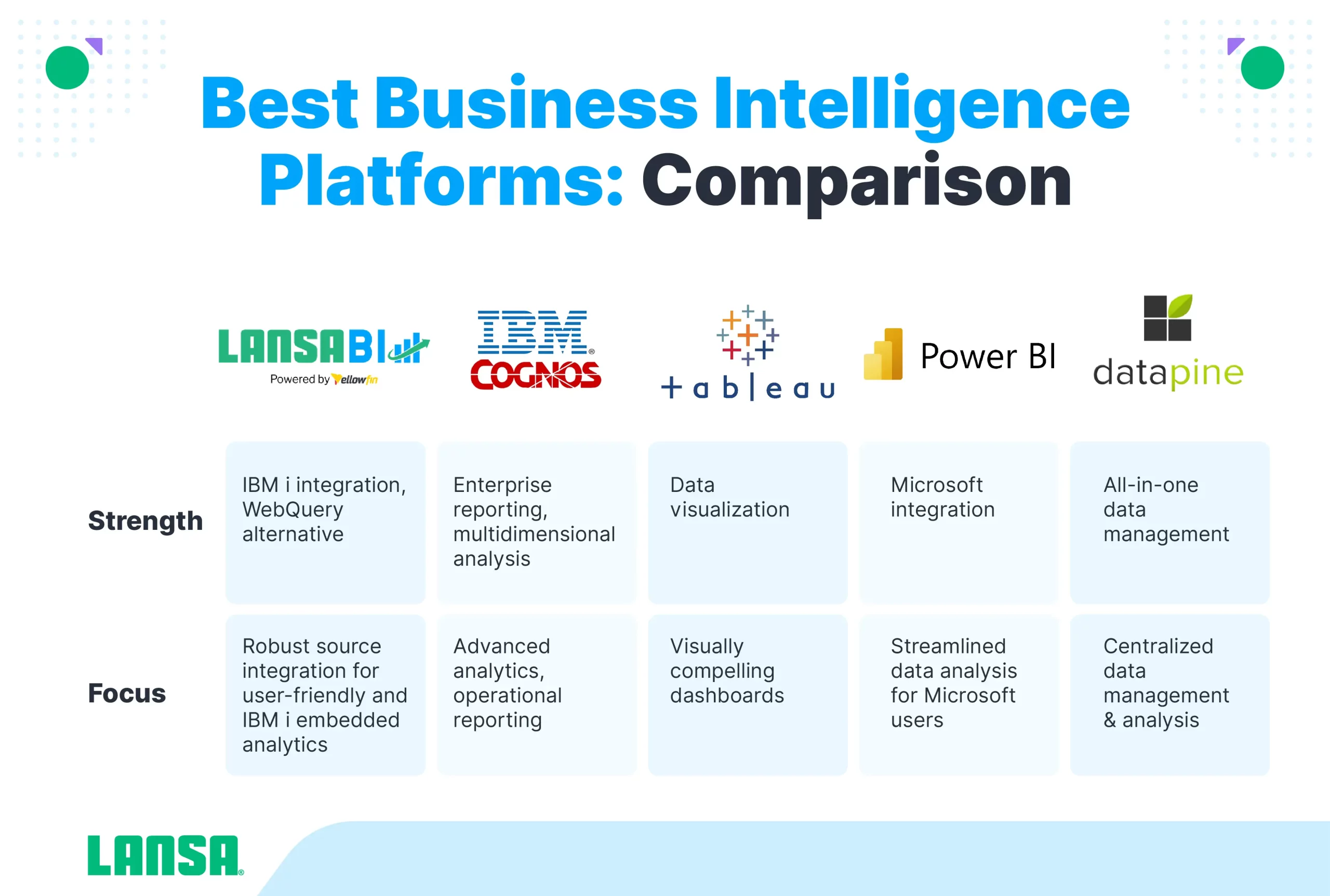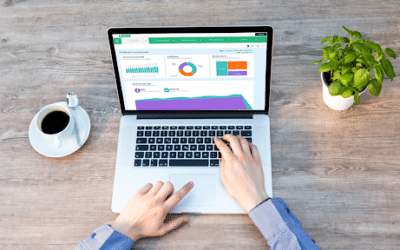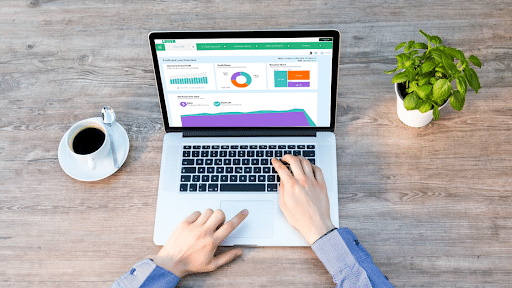Today’s world is driven by data and businesses need effective tools to gather, analyze, and visualize their data in order to make informed decisions. This is where a business intelligence platform can help.
Key insights
- Empower everyone: A BI platform can democratize data, fostering a data-driven culture across your organization.
- See clearly; act confidently: A BI platform can give you a comprehensive view of business performance to identify trends, optimize processes, and stay ahead of the curve.
- Find the right fit: Consider factors such as scalability, ease of use, and data management capabilities to choose a BI platform that meets your needs.
- Unlock the power of IBM i data: Consider LANSA BI, a robust BI platform designed to leverage the strengths of your IBM i investment.
What Is a Business Intelligence Platform?
A business intelligence platform is designed to collect, integrate, and analyze data from various sources within an organization. A BI platform serves as a centralized hub for gathering and storing structured and unstructured data, enabling businesses to transform raw information into actionable insights.
A business intelligence platform leverages advanced analytics, data mining technologies, and visualization tools to uncover patterns, trends, and correlations that would otherwise remain hidden. By presenting data in an easily digestible format, such as interactive dashboards and reports, a business intelligence platform empowers organizations to:
- Become data-driven: Business intelligence platforms democratized data, making insights accessible to everyone, fostering a culture of data back decisions across all levels.
- Gain a competitive advantage: BI platforms allow you to analyze market trends, understand customer behavior, and stay ahead of the curve by uncovering competitor strategies.
- Optimize operations: Business intelligence platforms can help identify bottlenecks, track key metrics, and streamline workflows to achieve peak efficiency and cost reduction.
- Mitigate risks: With a BI platform, you can monitor key risk indicators and ensure regulatory compliance, proactively addressing potential issues before they escalate.
Why Are Business Intelligence Platforms Important?
In our data-driven world, using a business intelligence platform is more important than ever. A BI platform acts as your organization’s central nervous system, providing a unified platform to gather and analyze data from disparate sources.
The BI reporting features of a business intelligence platform democratize data, making it accessible to a wider range of users across the organization. Here are some specific situations where BI platforms can significantly benefit your organization:
- Boosting sales and marketing performance: BI platforms can help you analyze customer behavior, identify buying trends, and optimize marketing campaigns for better ROI. Imagine being able to identify your most profitable customer segments and tailor marketing efforts accordingly.
- Optimizing operational efficiency: BI platforms can streamline workflows, identify bottlenecks in processes, and track key performance indicators (KPIs) to ensure smooth operations. For example, you could use a BI platform to analyze production line data and identify areas for improvement, leading to increased efficiency and reduced costs.
- Making data-driven decisions across all levels: BI platforms empower not just data analysts, but also department heads and business users to access and leverage data insights. This fosters a data-driven culture where informed decisions are made at every level of the organization.
- Staying ahead of the competition: BI platforms provide valuable insights into market trends and competitor behavior. By analyzing competitor pricing strategies and customer preferences, you can make informed decisions to stay ahead of the curve.
- Improving risk management and regulatory compliance: BI platforms can help you monitor key risk indicators and ensure adherence to regulations. For example, you could use a BI platform to track financial data and identify potential financial risks early on.
Features & Capabilities of a BI Platform
A robust enterprise business intelligence platform does more than store data. An enterprise BI platform offers a comprehensive set of BI capabilities to empower you to unlock your information. These business intelligence platform capabilities can be broadly categorized into the following key functionalities.
A robust enterprise business intelligence platform does more than store data. An enterprise BI platform offers a comprehensive set of BI capabilities to empower you to unlock your information. These business intelligence platform capabilities can be broadly categorized into the following key functionalities.
Collect Data
A BI platform can gather data from a wide range of sources, including databases, spreadsheets, and social media. This ensures a holistic view of your organization’s performance. By leveraging its powerful data ingested capabilities, a business intelligence platform enables organizations to integrate and collect data seamlessly.
Process Data
Raw data often needs cleaning and transformation before you can use the analysis features of a BI platform. A business intelligence platform offers tools to ensure the accuracy and consistency of your data. BI features like LANSA’s guided natural language query (NLQ) facilitate the extraction of actionable insights, streamlining the journey from data to decision in the LANSA BI platform.
Analyze Data
Analysis is where data’s true potential is unlocked in a business intelligence platform. A comprehensive business intelligence platform offers robust analytic tools that enable users to slice and dice data, create calculated fields, and perform ad hoc queries. With features like LANSA’s assisted insights generation, end users are empowered to make data-driven choices, and with guided NLQ, even non-technical users can customize their data exploration.
Visualize Data
Turning complex data sets into easily digestible visuals is a key strength of business analytics platforms. Interactive charts and graphs organized into customizable business intelligence dashboards make it easier to identify trends, patterns, and outliers. A powerful business intelligence platform offers a wide range of data visualization capabilities, allowing users to communicate complex information. Learn more about how a business intelligence platform can help you visualize business data.
Understand Data
Once your data is collected and processed by the business intelligence platform, the BI platform provides functionalities to explore and comprehend it. LANSA’s video demonstrates how users can gain a deeper understanding of their data with their BI platform, fostering an environment where insights are not just seen but comprehended.
Report Data
A BI platform provides robust reporting features that enable users to generate comprehensive, customizable reports that can be scheduled, distributed, and shared with stakeholders. LANSA’s BI reporting capabilities empower organizations to make data-driven decisions based on up-to-date information. This is the power of data storytelling, which weaves data points into a compelling narrative, using visuals and clear communication to find insights that resonate with the report’s audience.
Benefits of Using a Business Intelligence Platform
Enterprise BI solutions and BI platforms offer numerous benefits to organizations, empowering them to make data-driven decisions, improve efficiency, gain a competitive advantage, and scale their operations.

Considerations When Choosing a Business Intelligence Platform
When it comes to selecting business intelligence and analytics software, organizations must carefully evaluate their specific needs and requirements for using a business intelligence platform.
Scalability
As your business grows, your data needs will inevitably grow as well. Your BI platform should be able to scale seamlessly to accommodate increasing data volumes and user demands. Consider these factors:
- Data source integration: Can the BI platform integrate with a variety of data sources beyond your core systems? Look for business intelligence platforms that support a wide range of databases, cloud applications, and even social media feeds to ensure a holistic view of your data.
- User scalability: Can the business intelligence platform handle a growing number of users without performance degradation? Explore options that offer flexible user tiers and consider cloud-based business intelligence platforms that can automatically scale resources as needed.
Ease of Use
Not everyone in your organization will be a data scientist. Your BI platform should cater to users with varying technical skill sets:
- Intuitive interface: Look for a BI platform with a clean and user-friendly interface that minimizes the learning curve.
- Drag-and-drop functionality: Business intelligence platform features like drag-and-drop for building reports and dashboards. This allows business users to tailor dashboards to their specific needs without relying solely on IT support.
- Self-service analytics: Self-service analytics in a BI platform allows users to ask questions about their data, create ad-hoc reports, and perform basic analysis without requiring advanced technical expertise.
Integration
In today’s complex IT landscape, seamless integration with existing systems is crucial:
- Data warehouse and CRM integration: Ensure your BI platform can connect with your data warehouses, CRM systems, and other applications to provide a unified view of your data and eliminate the need for manual data extraction.
- API connectivity: Look for a business intelligence platform with open APIs that allow integration with custom applications you might use in your organization, Ensuring smooth data flow across your entire technology ecosystem.
- IBM i integration: LANSA’s BI platform seamlessly integrates with your IBM i system, leveraging JDBC-based Db2 integration to provide real-time insights from your existing data.
Automation
Streamlining workflows and automated repetitive tasks is a key benefit of a BI platform:
- Data collection and transformation automation: Features that automate data collection and transformation from various sources can significantly reduce manual effort and improve data quality. This frees up valuable time for IT teams and data analysts to focus on higher-level tasks.
- Automated reporting and alerts: Automated report generation and scheduling can keep stakeholders informed with the latest insights. BI platform alerts based on key performance indicators can proactively flag potential issues for timely intervention, enabling a more proactive approach to problem-solving.
Data Management
Robust data management capabilities are essential for ensuring the accuracy and consistency of the data you use in your business intelligence platform. To maintain the integrity of your information, the BI platform you choose should offer tools for:
- Data cleansing: Your business intelligence platform should be able to identify and address inaccuracies in your data. This may include features to handle missing values, identify and correct data inconsistencies like typos or duplicate entries, and standardized data formats to ensure consistency across all data sources.
- Data governance: Your BI platform should be able to track the origin and movement of data throughout its lifecycle. These features should allow you to:
- Define data ownership and access controls: To safeguard confidential information, your business intelligence platform should restrict access to sensitive data based on user roles and permissions within the organization.
- Implement data lineage tracking: Track the origin and movement of data throughout its life cycle for increased transparency and auditability.
- Enforce data quality standards: Define data quality rules and set up automated alerts for potential data quality issues, maintaining the reliability of your insights.
Built-In AI
As artificial intelligence (AI) continues to advance, it’s increasingly integrated into business intelligence platforms, offering powerful capabilities that can enhance your data analysis and decision-making. Here are some AI features to consider:
- Natural language processing (NLP): NLP enables you to interact with your data using natural language queries, making it easier to explore and gain insights.
- Predictive analytics: AI-powered predictive analytics can forecast future trends and outcomes based on historical data.
- Automated insights generation: AI can automatically identify patterns, trends, and anomalies within your data, providing valuable insights without requiring extensive manual analysis.
5 Best Business Intelligence Platforms
Having explored the key considerations for selecting a BI platform, let us examine some of the best BI tools on the market. These five business intelligence platforms are considered the best-in-class.

Having explored the key considerations for selecting a BI platform, let us examine some of the best BI tools on the market. These five business intelligence platforms are considered the best-in-class.
LANSA BI
For organizations using IBM i data, LANSA BI stands out as a compelling business intelligence platform. This BI platform seamlessly integrates with your existing IBM i infrastructure, providing real-time IBM i insights for data exploration and analysis. LANSA’s business intelligence platform offers a powerful alternative to WebQuery, empowering you to unlock real-time insights from your IBM i data and transform decision-making.
IBM Cognos
IBM Cognos caters to organizations requiring robust reporting and advanced analytics capabilities. This enterprise-grade BI platform excels in multidimensional analysis, allowing users to drill down into data from various perspectives. IBM Cognos is well-suited for businesses with complex data needs and a focus on operational reporting and data warehousing.
Tableau
Tableau is a BI platform renowned for its data visualization capabilities. This business intelligence platform offers a wide range of chart types, interactive features, and customization options. Tableau’s BI platform is well-suited for organizations that prioritize data insights to a broad audience.
Power BI
For businesses in the Microsoft ecosystem, Power BI is the top BI platform. Microsoft’s business intelligence platform is integrated with other Microsoft products, enabling a streamlined workflow. Microsoft’s BI platform also boasts a robust community and extensive learning resources, making it a user-friendly option for those familiar with the Microsoft suite.
Datapine
Datapine positions itself as a solution that includes data management and a BI platform. This business intelligence platform has more features than basic BI analytics software, like data warehousing, data cleansing, and data transformation tools. Datapine’s BI platform caters to businesses seeking a comprehensive solution to manage and analyze their data.
Conclusion
In a world driven by data, a business intelligence platform is no longer a luxury, but a necessity. A business intelligence platform offers a comprehensive suite of features and capabilities, from data collection and processing to advanced analytics, visualization, and reporting. A BI platform empowers you to transform raw data into actual insights, fueling informed decision-making in propelling your organization toward success.
When choosing a BI platform, consider factors such as scalability, ease of use, integration capabilities, automation features, and robust data management tools. Solutions like LANSA BI, designed specifically for IBM i systems, offer a tailored approach for organizations operating in that environment, while BI platforms like Yellowfin BI, Tableau, Power BI, and Datapine cater to a different range of needs and data sources.
The right business intelligence platform can empower businesses to unlock the true value of their data, fostering a data-driven culture and enabling them to stay ahead in an increasingly competitive market. Connect with LANSA today to find out more about LANSA BI.










